DEF CON 32 + 📅 + ⚙️
Table of Contents
- Event Overview
- Schedule
- Friday Talks
- DONE Welcome to DEF CON
- Spies and bytes: Victory in the digital age
- Mobile mesh RF network exploitation: Getting the tea from GoTenna
- Where's the money: Defeating ATM disk encryption
- Securing CCTV cameras against blind spots
- Behind enemy lines: Going undercover to breach the LockBit ransomware operation
- Open sesame - or how vulnerable is your stuff in electronic lockers
- No symbols when reversing? No problem: Bring your own
- The XZ backdoor story: The undercover operation that set the internet on fire
- Atomic honeypot: A MySQL honeypot that drops shells
- Listen to the whispers: Web timing attacks that actually work
- High intensity deconstruction: Chronicles of a cryptographic heist
- Fireside chat with DNSA Anne Neuberger
- DONE On your Ocean's 11 team, I'm the AI guy (technically girl)
- Veilid dev and community meetup
- DONE Kicking in the door to the cloud: Exploiting cloud provider vulnerabilities for initial access
- If existing cyber vulnerabilities magically disappeared overnight, what would be next?
- DONE Sshamble: Unexpected exposures in the secure shell
- Defeating EDR evading malware with memory forensics
- Digital emblems: When markings are required under international law, but you don't have a rattle-can handy
- Xiaomi the money - Our Toronto Pwn2Own exploit and behind the scenes story
- Fireside chat and AMA with the Dark Tangent and Jen Easterly
- DONE Optical espionage: Using lasers to hear keystrokes through glass windows
- The way to Android root: Exploiting your GPU on smartphone
- DONE Breaching AWS accounts through shadow resources
- DC101 PANEL
- Abusing Windows Hello without a severed hand
- DONE Taming the beast: Inside the LLAMA 3 red team process
- Android app usage and cell tower location: Private. Sensitive. Available to anyone?
- Social engineering like you're Picard
- Making the DEF CON 32 badge
- SQL injection isn't dead: Smuggling queries at the protocol level
- Outlook unleashing RCE chaos: CVE-2024-30103 & CVE-2024-38021
- Leveraging private APNS for mobile network traffic analysis
- Why are you still using my server for your internet access
- DONE Bricked & abandoned: How to keep the IoT from becoming an internet of trash
- One for all and all for WHAD: Wireless shenanigans made easy!
- DONE Breaking secure web gateways (SWG) for fun and profit
- Exploiting Bluetooth - from your car to the bank account$$
- Stranger in a changed land
- Saturday Talks
- The Pwnie Awards
- Laundering money
- Mutual authentication is optional
- DONE Reverse engineering MicroPython frozen modules: Data structures, reconstruction, and reading bytecode
- Cult of the Dead Cow & friends present: Prime cuts from hacker history - 40 years of 31337
- Gotta cache 'em all: Bending the rules of web cache exploitation
- Smishing smackdown: Unraveling the threads of USPS smishing and fighting back
- The rise and fall of binary exploitation
- Shim me what you got - Manipulating shim and office for code injection
- Quickshell: Sharing is caring about an RCE attack chain on Quick Share
- Sudos and sudon'ts - Peering inside sudo for Windows
- DONE Disenshittify or die! How hackers can seize the means of computation and build a new, good internet that is hardened against our asshole bosses' insatiable horniness for enshittification.
- Grand theft actions: Abusing self-hosted GitHub runners at scale
- Deception & counter deception – Defending yourself in a world full of lies
- AMD SinkClose: Universal ring -2 privilege escalation
- The secret life of a rogue device - Lost IT assets on the public marketplace
- Fireside chat with National Cyber Director Harry Coker, Jr.
- Oh-my-DC: Abusing OIDC all the way to your cloud
- Inside the FBI's secret encrypted phone company 'ANOM'
- NTLM - The last ride
- Behind enemy lines: Engaging and disrupting ransomware web panels
- Eradicating Hepatitis C with bioterrorism
- Discovering and exploiting local attacks against the 1Password macOS desktop application
- Hacking millions of modems (and investigating who hacked my modem)
- Troll trapping through TAS tools: Exposing speedrunning cheaters
- Ace up the sleeve: From getting JTAG on the iPhone 15 to hacking into Apple's new USB-C controller
- Exploiting the unexploitable: Insights from the Kibana bug bounty
- Measuring the Tor network
- A shadow librarian in broad daylight: Fighting back against ever encroaching capitalism
- Hookchain: A new perspective for bypassing EDR solutions
- Unsaflok: Hacking millions of hotel locks
- Compromising an electronic logging device and creating a truck2truck worm
- Secrets and shadows: Leveraging big data for vulnerability discovery at scale
- Encrypted newspaper ads in the 19th century: The world's first worldwide secure communication system
- Watchers being watched: Exploiting the surveillance system and its supply chain
- DEF CON Academy: Cultivating m4d sk1llz in the DEF CON community
- Breaking the beam: Exploiting VSAT satellite modems from the Earth's surface
- Techniques for creating process injection attacks with advanced return-oriented programming
- A treasure trove of failures: What history's greatest heist can teach us about defense in depth
- Iconv, set the charset to RCE: Exploiting the glibc to hack the PHP engine
- Nano-Enigma: Uncovering the secrets within eFuse memories
- Sunday Talks
- DONE Splitting the email atom: Exploiting parsers to bypass access controls
- AWS CloudQuarry: Digging for secrets in public AMIs
- Windows downdate: Downgrade attacks using Windows updates
- Unlocking the gates: Hacking a secure industrial remote access solution
- The not-so-silent type: Breaking network crypto in almost every popular Chinese keyboard app
- Changing global threat landscape with Rob Joyce and Dark Tangent
- DONE (|(MALDAPTIVE:¯\(LDAP)_/¯=OBFUSC8T10N) (DE-OBFUSCATION &:=DE*TE)(!C=TION))
- The hack, the crash and two smoking barrels. (And all the times I (almost) killed an engineer.)
- Dragon slaying guide: Bug hunting in VMware device virtualization
- Friday Talks
- Main Tracks
- Villages
- Contests and Events
- Code of Conduct
- Registration Information
- Utilities

Event Overview
DEF CON 32 is the latest iteration of one of the world's largest and most notable hacking conferences. Founded in 1993, DEF CON brings together computer security professionals, journalists, lawyers, federal government employees, security researchers, students, and hackers with a general interest in computer security.
Schedule
Friday Talks
DONE Welcome to DEF CON
Spies and bytes: Victory in the digital age
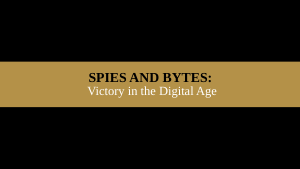
Mobile mesh RF network exploitation: Getting the tea from GoTenna
Where's the money: Defeating ATM disk encryption
Securing CCTV cameras against blind spots

Behind enemy lines: Going undercover to breach the LockBit ransomware operation
Open sesame - or how vulnerable is your stuff in electronic lockers
No symbols when reversing? No problem: Bring your own
The XZ backdoor story: The undercover operation that set the internet on fire

Atomic honeypot: A MySQL honeypot that drops shells
Listen to the whispers: Web timing attacks that actually work
High intensity deconstruction: Chronicles of a cryptographic heist
Fireside chat with DNSA Anne Neuberger
DONE On your Ocean's 11 team, I'm the AI guy (technically girl)
Veilid dev and community meetup
DONE Kicking in the door to the cloud: Exploiting cloud provider vulnerabilities for initial access
If existing cyber vulnerabilities magically disappeared overnight, what would be next?
DONE Sshamble: Unexpected exposures in the secure shell
Defeating EDR evading malware with memory forensics
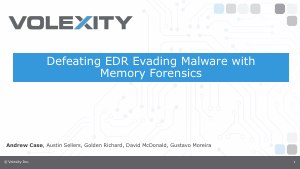
Digital emblems: When markings are required under international law, but you don't have a rattle-can handy
Xiaomi the money - Our Toronto Pwn2Own exploit and behind the scenes story
Fireside chat and AMA with the Dark Tangent and Jen Easterly
DONE Optical espionage: Using lasers to hear keystrokes through glass windows
The way to Android root: Exploiting your GPU on smartphone
DONE Breaching AWS accounts through shadow resources
DC101 PANEL
Abusing Windows Hello without a severed hand

DONE Taming the beast: Inside the LLAMA 3 red team process
Android app usage and cell tower location: Private. Sensitive. Available to anyone?
Social engineering like you're Picard
Making the DEF CON 32 badge
SQL injection isn't dead: Smuggling queries at the protocol level
Outlook unleashing RCE chaos: CVE-2024-30103 & CVE-2024-38021
Leveraging private APNS for mobile network traffic analysis
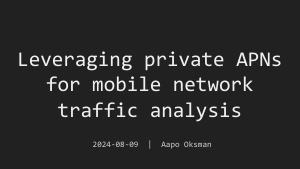
Why are you still using my server for your internet access

DONE Bricked & abandoned: How to keep the IoT from becoming an internet of trash
One for all and all for WHAD: Wireless shenanigans made easy!
DONE Breaking secure web gateways (SWG) for fun and profit
Exploiting Bluetooth - from your car to the bank account$$
Stranger in a changed land
Saturday Talks
The Pwnie Awards
Laundering money
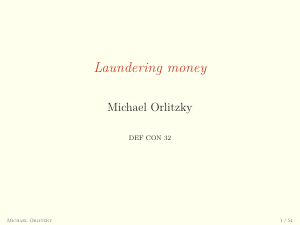
Mutual authentication is optional
DONE Reverse engineering MicroPython frozen modules: Data structures, reconstruction, and reading bytecode

Cult of the Dead Cow & friends present: Prime cuts from hacker history - 40 years of 31337
Gotta cache 'em all: Bending the rules of web cache exploitation
Smishing smackdown: Unraveling the threads of USPS smishing and fighting back
The rise and fall of binary exploitation
Shim me what you got - Manipulating shim and office for code injection
Quickshell: Sharing is caring about an RCE attack chain on Quick Share

Sudos and sudon'ts - Peering inside sudo for Windows
DONE Disenshittify or die! How hackers can seize the means of computation and build a new, good internet that is hardened against our asshole bosses' insatiable horniness for enshittification.
Grand theft actions: Abusing self-hosted GitHub runners at scale
Deception & counter deception – Defending yourself in a world full of lies

AMD SinkClose: Universal ring -2 privilege escalation
The secret life of a rogue device - Lost IT assets on the public marketplace
Fireside chat with National Cyber Director Harry Coker, Jr.
Oh-my-DC: Abusing OIDC all the way to your cloud
Inside the FBI's secret encrypted phone company 'ANOM'
NTLM - The last ride
Behind enemy lines: Engaging and disrupting ransomware web panels
Eradicating Hepatitis C with bioterrorism

Figure 1: Discovering and exploiting local attacks against the 1Password macOS desktop application
Discovering and exploiting local attacks against the 1Password macOS desktop application
Hacking millions of modems (and investigating who hacked my modem)

Figure 2: Troll trapping through TAS tools: Exposing speedrunning cheaters
Troll trapping through TAS tools: Exposing speedrunning cheaters
Ace up the sleeve: From getting JTAG on the iPhone 15 to hacking into Apple's new USB-C controller
Exploiting the unexploitable: Insights from the Kibana bug bounty
Measuring the Tor network
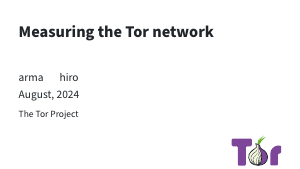
A shadow librarian in broad daylight: Fighting back against ever encroaching capitalism
Hookchain: A new perspective for bypassing EDR solutions
Unsaflok: Hacking millions of hotel locks
Compromising an electronic logging device and creating a truck2truck worm
Secrets and shadows: Leveraging big data for vulnerability discovery at scale
Encrypted newspaper ads in the 19th century: The world's first worldwide secure communication system
Watchers being watched: Exploiting the surveillance system and its supply chain
DEF CON Academy: Cultivating m4d sk1llz in the DEF CON community
Breaking the beam: Exploiting VSAT satellite modems from the Earth's surface
Techniques for creating process injection attacks with advanced return-oriented programming
A treasure trove of failures: What history's greatest heist can teach us about defense in depth
Iconv, set the charset to RCE: Exploiting the glibc to hack the PHP engine
Nano-Enigma: Uncovering the secrets within eFuse memories
Sunday Talks
DONE Splitting the email atom: Exploiting parsers to bypass access controls
AWS CloudQuarry: Digging for secrets in public AMIs
Windows downdate: Downgrade attacks using Windows updates
Unlocking the gates: Hacking a secure industrial remote access solution
The not-so-silent type: Breaking network crypto in almost every popular Chinese keyboard app
Changing global threat landscape with Rob Joyce and Dark Tangent
DONE (|(MALDAPTIVE:¯\(LDAP)_/¯=OBFUSC8T10N) (DE-OBFUSCATION &:=DE*TE)(!C=TION))
The hack, the crash and two smoking barrels. (And all the times I (almost) killed an engineer.)
Dragon slaying guide: Bug hunting in VMware device virtualization
Main Tracks
Friday, August 09
Saturday, August 10
Sunday, August 11
Villages
DEF CON villages are dedicated spaces and communities focusing on specific security topics:
- AI Village
- Aerospace Village
- Car Hacking Village
- Crypto & Privacy Village
- Ethics Village
- IoT Village
- Lockpicking Village
- Packet Hacking Village
- Recon Village
- Social Engineering Village
Contests and Events
- Capture the Flag (CTF) - https://github.com/Nautilus-Institute/quals-2024
- Hacking Challenges
- Lock Picking Contests
- Hacker Jeopardy
- Beverage Cooling Contraption Contest
Code of Conduct
DEF CON is dedicated to providing a harassment-free conference experience for everyone, regardless of gender, sexual orientation, disability, physical appearance, body size, race, or religion.
Registration Information
Utilities
Logo
# Function: defcon_download_and_resize_logo # Input: None (uses global variables) # Output: Downloads DEFCON logo, resizes it to various dimensions, and generates a manifest defcon_download_and_resize_logo()
Program
# Function: defcon_download_and_extract_program # Input: None (uses global variables) # Output: Downloads DEFCON program, extracts relevant information, and generates a manifest defcon_download_and_extract_program()
Media Server Mirror
# Function: defcon_mirror_media_server # Input: None (uses global variables) # Output: Downloads and processes PDF files, storing them in OUTPUT_DIR # Generates a manifest file with source URL, output dir, and filter rules defcon_mirror_media_server()
Summary Environment
# Dockerfile for DEF CON 32 Summary Environment # # Purpose: Set up a containerized environment for processing and analyzing DEF CON 32 data # # Key components: # - Base image: Ubuntu 20.04 (or appropriate alternative) # - User: Non-root user 'defcon_user' for improved security # - Installed tools: curl, wget, imagemagick, jq (add others as needed) # - Scripts: Custom scripts for data processing and analysis # - Services: Web server (e.g., Nginx) for serving content (if needed) # - Ports: 80 exposed for web service (modify as needed) # - Volumes: /home/defcon_user/data for persistent storage # - Entrypoint: Default to bash, with option for custom script # # Build with: docker build -t defcon32-summary . # Run with: docker run -it -p 8080:80 -v /path/to/data:/home/defcon_user/data defcon32-summary
Summarized Talks
def defcon_read_template(file_path: str) -> str: """ Read the content of a template file. Args: file_path (str): Path to the template file. Returns: str: Content of the template file. """ def defcon_read_pdf(file_path: str) -> TalkContent: """ Extract text content from a PDF file with error handling. Args: file_path (str): Path to the PDF file. Returns: TalkContent: Extracted text content and metadata from the PDF. """ def defcon_get_ollama_summary(content: TalkContent, prompt_template: str) -> Summary: """ Generate a summary using the Ollama API with type validation. Args: content (TalkContent): The content to summarize. prompt_template (str): The template for the summarization prompt. Returns: Summary: A validated summary of the content. """ def defcon_process_talk_pdfs(pdf_dir: str, output_dir: str, prompt_template: str) -> None: """ Process all PDF files in a directory, generate summaries, and save them. Args: pdf_dir (str): Directory containing the PDF files to process. output_dir (str): Directory to save the generated summaries. prompt_template (str): Template for the summarization prompt. """ def main(pdf_dir: str, template_path: str, output_dir: str): """ Main function to process DEF CON 32 talk PDFs and generate summaries. Args: pdf_dir (str): Directory containing mirrored DEF CON 32 talk PDFs. template_path (str): Path to the prompt template file. output_dir (str): Directory to save the summaries (defaults to a temporary directory). """ def defcon_process_summaries(pdf_dir: str, output_dir: str, template_path: str): """ Process summaries for DEF CON 32 talks. Args: pdf_dir (str): Directory containing the PDF files to process. output_dir (str): Directory to save the generated summaries. template_path (str): Path to the prompt template file. """
graph TD A[Start] --> B[main] B --> C[defcon_process_summaries] C --> D[defcon_read_template] C --> E[defcon_process_talk_pdfs] E --> F[defcon_read_pdf] E --> G[defcon_get_ollama_summary] G --> H[End]
Input
python defcon_process_summaries.py example.pdf
Output
{
"title": "Exploiting Lorem Ipsum: New Vulnerabilities in Placeholder Text Generation",
"speakers": ["Dr. Jane Doe", "John Smith"],
"main_points": [
"Discovered critical vulnerabilities in popular lorem ipsum generators",
"Developed a new tool, 'IpsumBreaker', to exploit these vulnerabilities",
"Demonstrated potential for data exfiltration through manipulated placeholder text",
"Proposed new security standards for text generation algorithms"
],
"technical_details": [
"Identified three main vulnerability types: buffer overflow, injection attacks, and algorithmic biases",
"IpsumBreaker tool uses machine learning to predict and manipulate text generation patterns",
"Successful exfiltration of sensitive data achieved in 87% of tested scenarios",
"Proposed 'Secure Lorem' standard includes input sanitization and entropy-based randomness"
],
"implications": [
"Widespread use of vulnerable lorem ipsum generators poses significant security risks",
"Need for immediate patching and updating of text generation tools across industries",
"Potential for new attack vectors in web development and publishing workflows",
"Highlights the importance of security considerations in seemingly benign tools"
],
"summary": "In their groundbreaking talk 'Exploiting Lorem Ipsum: New Vulnerabilities in Placeholder Text Generation', Dr. Jane Doe and John Smith unveiled critical security flaws in widely-used lorem ipsum generators. The researchers developed 'IpsumBreaker', an advanced tool leveraging machine learning to exploit these vulnerabilities, demonstrating the potential for data exfiltration through manipulated placeholder text. Their methodology involved comprehensive analysis of popular generators, identifying three primary vulnerability types: buffer overflow, injection attacks, and algorithmic biases. The team achieved a staggering 87% success rate in exfiltrating sensitive data across various test scenarios. To address these issues, they proposed the 'Secure Lorem' standard, emphasizing input sanitization and entropy-based randomness in text generation. This research has far-reaching implications for web development and publishing industries, highlighting the need for immediate security updates and a reevaluation of text generation tool usage in professional workflows. The presentation underscores the critical importance of considering security even in seemingly innocuous tools and processes."
}
Talk Entry
*** Taming the beast: Inside the LLAMA 3 red team process :PROPERTIES: :ID: taming-llama3-red-team :SPEAKERS: Aaron Grattafiori, Ivan Evtimov, Joanna Bitton, Maya Pavlova :TRACK: Track 3 (Hall 1 - Aisle 11-03) :TIME: 15:30 :DURATION: 45 minutes :END:
Extracted Schedule
(defun defcon/extract-schedule-to-json (&optional max-talks-per-day) "Extract schedule from the current Org file and save it as JSON. Optionally limit the number of talks per day to MAX-TALKS-PER-DAY. If MAX-TALKS-PER-DAY is provided and greater than 0, the function will limit the number of talks extracted for each day to this value. The extracted schedule is saved to a JSON file with a name based on the current buffer's filename. If MAX-TALKS-PER-DAY is used, it's reflected in the output filename. Returns nil and displays a message if no schedule is found in the current file.") (defun defcon/extract-schedule (max-talks-per-day) "Extract the schedule from the current Org buffer. MAX-TALKS-PER-DAY is an optional limit on the number of talks extracted per day. If nil or 0, all talks are extracted. Returns a list of cons cells, where each cell contains a day and its associated talks. The list is sorted chronologically by day. Each talk is represented as a property list containing information such as title, ID, speakers, track, time, and duration. This function is typically called by `defcon/extract-schedule-to-json' to process the Org buffer contents.") (defun defcon/extract-talks-for-day (max-talks) "Extract talks for the current day, optionally limiting to MAX-TALKS. MAX-TALKS is an optional limit on the number of talks to extract. If nil or 0, all talks for the day are extracted. Returns a list of property lists, each representing a talk with properties such as title, ID, speakers, track, time, and duration. This function is called by `defcon/extract-schedule' for each day in the schedule. It processes talk entries under the current day's heading in the Org file.")
graph TD A[Start] --> B[defcon/extract-schedule-to-json] B --> C[defcon/extract-schedule] C --> D[defcon/extract-talks-for-day] D --> E[End]
Output
{
"Friday Talks": [
{
"title": "DONE Welcome to DEF CON",
"id": "welcome-to-defcon",
"speakers": "Jeff \"The Dark Tangent\" Moss",
"track": "Track 1 (Hall 1 - Aisle 11-01)",
"time": "10:00",
"duration": "20 minutes"
}
]
}
Child Schedules
(defun defcon/set-scheduled-and-update-children () "Set SCHEDULED property for current heading and update child schedules. Interactively prompts for a new date, sets the SCHEDULED property for the current heading, and then updates all child schedules to match the new date while preserving their individual times.") (defun defcon/update-child-schedules () "Update SCHEDULED timestamps of child nodes based on the parent's SCHEDULED date. Traverses all child nodes of the current heading, updating their SCHEDULED timestamps to match the parent's date while preserving their individual times. Requires TIME and DURATION properties on child nodes.")
graph TD A[Start] --> B[defcon/set-scheduled-and-update-children] B --> C{New date entered?} C -->|Yes| D[Set SCHEDULED property] D --> E[Set DATE property] E --> F[defcon/update-child-schedules] F --> G[org-back-to-heading] G --> H{Parent SCHEDULED exists?} H -->|Yes| I[Parse parent date] I --> J[org-map-entries] J --> K{Is child node?} K -->|Yes| L{Has TIME and DURATION?} L -->|Yes| M[Calculate new SCHEDULED] M --> N[Set child SCHEDULED] N --> J L -->|No| J K -->|No| J J --> O{All entries processed?} O -->|No| J O -->|Yes| P[End] H -->|No| P C -->|No| P
Output
** Friday Talks SCHEDULED: <2024-08-09 Fri> :PROPERTIES: :DATE: 2024-08-09 :END: *** DONE Welcome to DEF CON SCHEDULED: <2024-08-09 Fri 10:00-10:20> :PROPERTIES: :ID: welcome-to-defcon :SPEAKERS: Jeff "The Dark Tangent" Moss :TRACK: Track 1 (Hall 1 - Aisle 11-01) :TIME: 10:00 :DURATION: 20 minutes :END:
Schedule by Track
Structure
(defconst defcon/schedule-title " + 📅" "Constant string used as a title prefix for the generated schedule.") (defun defcon/org-parse-talks () "Parse DEF CON talks from the current Org buffer. Returns a list of property lists, each representing a talk with properties such as :title, :time, :track, and :id. Only considers headings with SCHEDULED, TRACK, and ID properties.") (defun defcon/org-clean-title (title) "Clean the talk TITLE by removing TODO keywords and truncating if necessary. Removes 'TODO' or 'DONE' prefixes and truncates titles longer than 50 characters, appending '...' to truncated titles.") (defun defcon/sanitize-title (title) "Aggressively sanitize TITLE for use in Org mode table cells and links, allowing colons. Removes special characters, square brackets, and excess whitespace. Truncates titles longer than 50 characters, appending '...' to truncated titles.") (defun defcon/clean-track (track) "Remove room information from TRACK. Strips any text within parentheses at the end of the track name.") (defun defcon/parse-scheduled (scheduled) "Parse SCHEDULED timestamp and return a time string. Converts the Org timestamp to a formatted string 'YYYY-MM-DD HH:MM'.") (defun defcon/get-ordered-days (talks) "Get the days from TALKS in chronological order. Returns a list of unique date strings extracted from talk timestamps, sorted chronologically.") (defun defcon/get-schedule-filename () "Generate schedule filename based on current buffer. Returns a filename for the schedule output, based on the current buffer's filename with '-schedule.org' appended. Throws an error if not visiting a file.") (defun defcon/org-generate-table () "Generate schedule tables from the current buffer and write them to a file. Parses talks, organizes them by day and track, formats tables, and writes the result to a file. Displays a message with the output filename.") (defun defcon/format-table (talks tracks day) "Format the schedule table for TALKS on DAY across TRACKS. Returns a string containing an Org mode table with talks organized by time slots and tracks. Includes links to talks using their IDs.") (defun defcon/human-readable-date (date-string) "Convert DATE-STRING to a human-readable format (e.g., 'Friday, August 11'). Takes a date string in 'YYYY-MM-DD' format and returns a string with the day of the week and month name.") (defun defcon/write-tables-to-file (tables output-file) "Write TABLES to OUTPUT-FILE. Writes the given tables (a list of strings) to the specified output file, adding a title with the defcon/schedule-title constant.") (defun defcon/get-track-color (track) "Get the color associated with TRACK. Returns a string representing the color for the given track.") (defun defcon/generate-ical (talks) "Generate an iCal file from TALKS. Creates an iCal file containing the schedule information from the given talks.") (defun defcon/org-generate-table-and-ical () "Generate schedule tables and an iCal file from the current buffer. Parses talks, generates schedule tables, and writes them to a file. Also generates an iCal file containing the schedule information. Displays messages with the output filenames.")
Control Flow
graph TD A[Start] --> B[defcon/org-generate-table-and-ical] B --> C[defcon/get-schedule-filename] B --> D[defcon/org-parse-talks] D --> E[defcon/org-clean-title] D --> F[defcon/clean-track] D --> G[defcon/parse-scheduled] B --> H[defcon/get-ordered-days] B --> I[defcon/format-table] I --> J[defcon/sanitize-title] I --> K[defcon/human-readable-date] B --> L[defcon/write-tables-to-file] B --> M[defcon/generate-ical] M --> N[defcon/get-track-color] L --> O[Write Org-mode file] M --> P[Write iCalendar file] O --> Q[End] P --> Q[End]
Example Outputs
Org-mode Table Output
* Schedule for Friday, August 09 | Time | Warstories Track | Track 4 | Track 1 | Track 2 | Track 3 | |-------------------------------------------------------------------| | 10:00 | Behind enemy lines: Going undercover to breach | Securing CCTV cameras against blind spots | Welcome to DEF CON | Mobile mesh RF network exploitation | Where's the money: Defeating ATM disk encryption |
iCalendar Output
BEGIN:VCALENDAR VERSION:2.0 PRODID:-//hacksw/handcal//NONSGML v1.0//EN BEGIN:VTIMEZONE TZID:America/Los_Angeles BEGIN:DAYLIGHT TZOFFSETFROM:-0800 TZOFFSETTO:-0700 TZNAME:PDT DTSTART:19700308T020000 RRULE:FREQ=YEARLY;BYDAY=2SU;BYMONTH=3 END:DAYLIGHT BEGIN:STANDARD TZOFFSETFROM:-0700 TZOFFSETTO:-0800 TZNAME:PST DTSTART:19701101T020000 RRULE:FREQ=YEARLY;BYDAY=1SU;BYMONTH=11 END:STANDARD END:VTIMEZONE BEGIN:VEVENT UID:welcome-to-defcon@defcon.org DTSTAMP:20240811T085500Z DTSTART;TZID=America/Los_Angeles:20240809T100000 DTEND;TZID=America/Los_Angeles:20240809T102000 SUMMARY:Welcome to DEF CON DESCRIPTION:Track: Track 1 CATEGORIES:Track 1 COLOR:#ffcccb END:VEVENT END:VCALENDAR
Schedule Management Workflow
graph TD A[Start] --> B[Download DEF CON 32 program PDF] B --> C[Extract schedule from p28-30] C --> D[Scaffold initial data structure] D --> E[Generate unique IDs for each talk] E --> F[Set initial talk times] F --> G{All times set?} G -->|No| F G -->|Yes| H[Assign talks to specific days] H --> I{All days assigned?} I -->|No| H I -->|Yes| J[Organize talks into tracks] J --> K{All tracks organized?} K -->|No| J K -->|Yes| L[Generate initial schedule table] L --> M[Review schedule] M --> N{Any conflicts or issues?} N -->|Yes| O[Adjust talk times or tracks] O --> M N -->|No| P[Set SCHEDULED property for each talk] P --> Q[Update child nodes' schedules] Q --> R[Regenerate final schedule table] R --> S[Export schedule to desired format] S --> T[End] subgraph "Initial Data Preparation" B C D end subgraph "Manual Data Entry" F H J end subgraph "Schedule Generation" L R end subgraph "Schedule Refinement" M N O P Q end